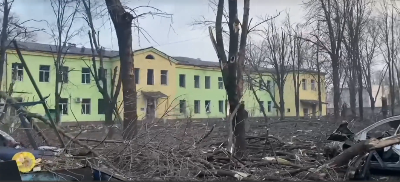Share
Human Rights Voices
While the UN devotes its human rights operations to the demonization of the democratic state of Israel above all others and condemns the United States more often than the vast majority of non-democracies around the world, the voices of real victims around the world must be heard.
Russian Federation, March 9, 2022
Ukrainian Children’s Hospital Destroyed By Russian Shelling
Original source
Russian shelling has devastated a children's hospital in the beleaguered port of Mariupol as humanitarian corridors set up to let civilians flee several besieged cities around Ukraine failed to materialize on the scale expected because of continued fighting, leaving hundreds of thousands trapped without basic supplies because of Moscow's unprovoked invasion.
Mariupol's City Council said a Russian attack on the hospital on March 9 caused “colossal” damage, while President Volodymyr Zelenskiy wrote on Twitter that there were “people, children under the wreckage” of the hospital. He called the strike an “atrocity” as authorities try to establish how many people had been killed or wounded.
"Children are under the wreckage. This is an atrocity! How much longer will the world be an accomplice by ignoring terror? Close the sky right now! Stop the killings! You have power but you seem to be losing humanity," Zelenskiy wrote referring to his calls for NATO to establish a no-fly zone over Ukraine.
The attack came on a day when Russia said its forces would "observe a regime of silence" from 10 a.m. Moscow time on March 9 to ensure safe passage for civilians wishing to leave Kyiv, Chernihiv, Sumy, Kharkiv, and the Black Sea port of Mariupol, which the Red Cross has said faces "apocalyptic" conditions.
But by late afternoon, officials reported mixed results in shuttling people out of the battle zones, with only safe corridors out of the eastern city of Sumy and the southern city of Enerhodar, the location of Europe's biggest nuclear power plant which Russian forces seized last week, being confirmed.
Russian forces were also reported to be preventing a convoy of 50 buses from evacuating civilians from the town of Bucha just outside of Kyiv, local authorities said, adding that talks continued on allowing the convoy to leave.
"Russia continues holding hostage over 400,000 people in Mariupol, blocks humanitarian aid and evacuation. Indiscriminate shelling continues," Ukraine's Foreign Minister Dmytro Kuleba wrote on Twitter. "Almost 3,000 newborn babies lack medicine and food."
The Office of the UN High Commissioner for Human Rights released fresh civilian casualty figures on March 9. It said that, since the start of the Russian invasion on February 24, 516 people have been killed and 908 injured.
It was quick to add in a statement that the agency "believes that the actual figures are considerably higher, especially in Government-controlled territory and especially in recent days, as the receipt of information from some locations where intense hostilities have been going on has been delayed and many reports are still pending corroboration."
The number of people to have fled Ukraine since the start of the Russian invasion continues to grow, with the head of the United Nations’ refugee agency, UNHCR, estimating on March 9 that the figure has now reached somewhere near 2.2 million people.
United Nations High Commissioner for Refugees Filippo Grandi told a news conference during a visit to Stockholm that "the time is now to try to help at the border," rather than discussions on the division of refugees between countries.
Early on March 9, with Russian missile and artillery attacks intensifying as the war stretched into its 14th day, Zelenskiy reiterated his call for a no-fly zone to protect Ukraine, saying that otherwise, the international community would be responsible for a mass humanitarian catastrophe.
But many NATO countries, along with other Western allies, have supplied only defensive weaponry to Kyiv amid threats from Moscow that any aggression against Russian ground or air forces would make the donors a direct party to the conflict and thus open to retaliation.
"We are further tightening the net of sanctions responding to Russia's military aggression against Ukraine," European Commission head Ursula von der Leyen wrote in a tweet.
Earlier in the day, Britain, which is not an EU member, unveiled new aviation sanctions under which any Russian plane can be detained while exports of aviation or space-related goods to Russia can also be banned.
U.S. Vice President Kamala Harris on March 9 begins a tour of two European NATO allies, Poland and Romania, to discuss the Russian invasion of Ukraine and the impact the war is having on the region, while Russian Foreign Minister Sergei Lavrov travels to Turkey, where he will meet Kuleba, on March 10.
Poland has publicly said it is willing to transfer its Russian-made MiG fighter jets to a U.S. military base in Germany to allow the aircraft to be handed over to Ukraine. But the Pentagon quickly dismissed the idea as untenable as warplanes flying from a U.S. and NATO base into airspace contested with Russia would raise the risk of the war expanding beyond Ukraine.

